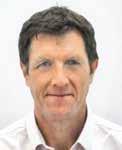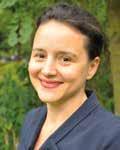Activities report 2022



The Global Forum on Productivity (GFP) was created in 2015 from an initiative of several teams in different parts of the OECD (Economics Department and Directorate for Science, Technology and Innovation) and endorsed by their respective OECD committees, namely the Economic Policy Committee (EPC), the Committee on Industry, Innovation and Entrepreneurship (CIIE) and the Economic Development Review Committee (EDRC). The GFP revolves around three axes – research, convening and communication – which draw upon, complement, and enhance the work already designated within the work programme of these Committees.
As a platform for mutual exchange of information and ideas, the GFP is a forum to discuss the latest analyses and best practices in public policy through which governments combine efforts to uncover the structural and policy factors behind the productivity slowdown. Through this concerted mission to foster international collaboration, the GFP gives government institutions the opportunity to discuss their views on institutional setups, share data and knowledge and undertake joint policy analysis.
The present Activities Report summarises the work carried out by the GFP over 2022 and is structured in five sections: (i) About the GFP; (ii) Research; (iii) Events; (iv) Communication; and (v) Summary.
The GFP is guided by its Steering Group, whose members fund the activities and decide the programme of work of the Forum, as well as the allocation of available funds among three main activities: research, convening and communication.
In addition to determining the work agenda of the GFP Secretariat at OECD, contributors have the possibility to engage in joint research and policy analysis.
They can also co-organise and host GFP events to catalyse the public debate about the importance of productivity growth in their country and to raise the international and domestic visibility of their respective institutions. These events also provide an opportunity to network with high-level academics at the forefront of productivity research as well as with officials from other countries.
Finally, GFP contributors have access to a password-protected interactive platform to facilitate information-sharing among them.
In 2022, the Steering Group was composed of 21 members, representing countries or international institutions: Australia, Belgium, Brazil, Canada, Costa Rica, Denmark, France, Germany, Hungary, Ireland, Italy, Japan, Luxembourg, New Zealand, Portugal, Spain, Slovenia, Sweden, the United Kingdom; the European Commission and the Asian Productivity Organization (APO).
Contact us to find out more about eligibility at productivity@oecd.org or visit our website: http://oe.cd/GFP
The Steering Group of the GFP appoints co-chairs to coordinate the activities of the Forum. In 2022, the GFP co-chairs were Rita Bessone Basto (Portugal), Ottavio Ricchi (Italy), and Stefan Profit (Germany).
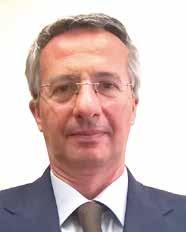

Rita Bessone Basto is currently Deputy Director of the Office for Strategy and Studies of the Portuguese Ministry of Economy and Digital Transition. Her current position involves work on the analysis of productivity and its determinants, in the context of the national productivity board; on policy evaluation models; and assessment and policy advice on economic developments and policies. She has previous work experience in areas of financial stability and macroprudential policy, DSGE models with financial frictions, international relations, and monetary and financial issues. She holds a Ph.D. in Economics from the University of Exeter (UK).
Ottavio Ricchi is Head of Unit in the Italian Ministry of Economy and Finance. He is responsible for potential output and structural public finance estimates, debt sustainability projections and productivity analysis, and he was formerly in charge of the macroeconomic forecasts unit and of the liaison unit with the EU-Economic Policy Committee. He is the chair of the EU-Output Gap Working Group. He graduated from the University of Naples and holds an MSc in economics at the University of York (UK) and a Ph.D. in Economics from the University of Exeter (UK). His main areas of interest include productivity analysis, economic modelling, public finance, and international economics.
Stefan Profit is the Deputy Director-General at the German Federal Ministry for Economic Affairs and Energy. His directorate deals with macroeconomic developments, economic analyses and projections. Before taking up this position, he was in charge of a unit focusing on the empirical research in the field of inclusive growth, productivity and investment, as well as assessing growth and distributional effects of structural reforms. Stefan is also Deputy chair of the OECD Working Party 1 of the Economic Policy Committee. He has an academic background in labour economics and holds a Ph.D. in Economics from Humboldt University Berlin.
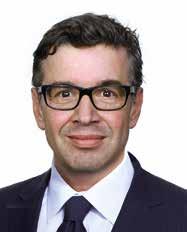
Participation in the Steering Group entails commitment to contribute a minimum of 25,000 euros per year to fund the GFP. This budget covers the following costs: (i) the policy research agenda elaborated according to the preferences of the Steering Group, (ii) the management of the network and the organization of events (conferences, workshops and other types of convening), and (iii) the communication and dissemination of the activities of the Forum. Contributors of the Steering Group are at the centre of the GFP and guide the activities of the Forum during Steering Group meetings. These meetings also give contributors an additional possibility to share any relevant work being done in their respective institutions.
During the Fall Steering Group meeting, the GFP presents the results of research work carried out during the year, contributors have a brief overview of the budget situation and decide the programme of work for the next year. By the end of the year, contributors receive a draft forecast of the budget for the next year and express their willingness to participate in the GFP during the forthcoming year. New membership proposals are also expected to be presented on this occasion.
At the Spring Steering Group meeting, contributors overview the budget situation of the previous year, receive its full financial report and a budget estimate for the ongoing year, appoint the co-chairs and overview the planned activities for the year. In view of improving the financial stability of the GFP and enhancing the coherence and continuity of its programme of work, contributors are expected to send their voluntary contributions by the Annual Conference of the GFP which takes place before summer.
l Presentation of analytical work
l Overview of the budget situation
l Agreement on the work programme of the next year
l Financial statement of the previous year and budget estimate for the current year
l Appointment of the Co-chairs for the current year
l Oversight of ongoing activities
l Countries are expected to send their voluntary contributions
The analytical activities of the GFP revolve around the programme of work established by the GFP Steering Group and help to spur and implement collaborative research within the OECD and in joint projects with member countries. The research topics explored by the GFP correspond to the priorities identified by Steering Group members and have synergies with the work programme of the OECD Committees.
In 2022, a new project was started, analysing the productivity implications of the Green transition. It draws on the expertise and data network built through the GFP’s Human Side of Productivity (HSOP) work, using linked employer employee datasets accessible through the GFP’s network of country partners.
The project aims to provide answers to a number of questions that arise for policy makers when designing productivity-enhancing policies to guide the Green transition. Is “going Green” compatible with a more productive economy? Do more productive firms rely more on Green skills? Will the Green transition widen the productivity gap or instead offer an opportunity for non-frontier firms to climb the productivity ladder?
A crucial factor for firms to succeed in the Green transition is the readiness of their workforce to master Green tasks. Many jobs entail a large number of tasks that are highly relevant for the Green transition (e.g., recycling) and likely to become more important in the future. Other jobs entail polluting activities (“Brown jobs”) that are likely to decline, or even disappear, as the Green transition progresses. Analysing how these jobs are distributed across firms can provide important insights into the future of productivity.
Building on the HSOP work which analysed the skills composition along the productivity distribution, this project looks at whether the most productive firms rely more on Green, and less on Brown jobs. To link shares of Green and Brown
jobs to productivity at the firm level, the project requires a detailed classification of Green and Brown jobs. Building on seminal work by Vona et al. (2018) who identify the Greenness and Brownness of occupations in the United States broken down according to the Standard Occupational Classification (SOC) system, a crosswalk to the detailed 4-digit International Standard Classification of Occupations (ISCO) is developed in order to allow cross-country comparisons. As a first output, this project thus provides various measures of the Greenness and Brownness of occupations in ISCO (Version 08). Green occupations are those that entail green-specific tasks. Conversely, “brown” jobs are associated with polluting activities (e.g., steel production).
1:
Source: OECD.
Standardised codes then collect systematic evidence on the share of detailed Green and Brown occupations by segments of the productivity distribution (frontier/medium/laggard) within narrowly defined industries. These codes have been applied to Linked Employer-Employee data from Portugal, France, and Denmark, with results available thus far suggesting that more productive firms indeed rely more on Green, and less on Brown jobs (Figure 1).
These results are corroborated through regressions that link productivity to the composition of the firm’s workforce and control for a host of factors such as size, management, and other skills, which tend to overlap with green skills. Analysis on the
2010-2017 Averages (Portugal and France)
first set of countries confirms an independent and statistically significant link of Green jobs with productivity, above and beyond the role of skills and other factors. For the average medium-productivity firm, imitating the Green share of the frontier firm would entail a 1-3% higher productivity.1
Once results from more countries become available, findings can be compared across countries, sectors and analysed over time, to better understand the role of industry characteristics, policy settings and recent technological advancements.
1. The size of the estimated coefficient varies depending on the skill control variable included in the model: without controlling for skills, the effect is around 3%; controlling for a skill measure that is based on workers’ relative pay, the estimate is 1%. Controlling for other measures of skills, such as education group, the effect is around 2%.
l Bluedorn, J. et al. (2022), Transitioning to a Greener Labor Market: Cross-Country Evidence from Microdata, https://ssrn.com/abstract=4178907
l Vona, F. et al. (2018), “Environmental regulation and green skills: an empirical exploration.”, Journal of the Association of Environmental and Resource Economists, Vol. 5/4, pp. 713-753, https://doi.org/10.1086/698859

Despite the increasing participation of women in the labour market, women remain largely underrepresented in leadership positions. Improving the chances that women access top management positions could matter beyond equality, as more diversity in decision-making and a larger talent pool could raise firm performance. This line of research is looking at the impact of gender diversity in top management on firm productivity.
Using a newly built dataset, across a broad range of firms, sectors, and countries, the study shows that gender diversity significantly boosts firm productivity. In particular, productivity gains from raising diversity are highest for firms with initially low female share in senior management. This result is in line with previous studies finding that more diversity in leadership style, preferences, and risk aversion in top management and a larger pool of potential candidates raise firm performance.
This paper provides important insights to policy makers. So far, the existing empirical evidence has focused on single-country studies, and provided
mixed evidence on the effect of gender diversity in senior management on firm performance. Further, this study also provides a novel approach to estimate the causal effect of gender diversity on firm performance based on instrumenting the firm specific female share with the average female share within similar groups of firms abroad.
The findings suggest substantial costs of underrepresentation of women at the top of the corporate hierarchy, and the importance for governments and firms to take action. A wide range of policies can help increasing the female representation in management positions. Beyond widely used mandatory gender quotas and voluntary targets, this also includes a range of further policy areas, such as family support policies, and policies aiming at combating gender stereotyping.
The final report was presented at the GFP Steering Group meeting in November 2022. The focus of the report consists of the cross-country firm-level analysis of the causal effect of gender diversity on firm productivity.
Note: The chart shows the distribution of the female share in top management across the firms in the sample, for the year 2019, including manufacturing and non-financial services sectors across 9 OECD countries, Belgium, Germany, Denmark, France, Great Britain, Ireland, Italy, Portugal, and Sweden.
Source: OECD calculations based on matched Orbis and Orbis Management Boards Directors module
Note: The chart shows the predicted productivity premium from the baseline model, an instrumental variable regression of total factor productivity on the female share and the square of the female share. The model controls for country-sector fixed effects and includes a broad set of firm level controls, based on size, age, and listed status. The estimation refers to the year 2019 and to 9 OECD countries, Belgium, Germany, Denmark, France, Great Britain, Ireland, Italy, Portugal, and Sweden.
Source: OECD calculations based on matched Orbis and Orbis Management Boards Directors module
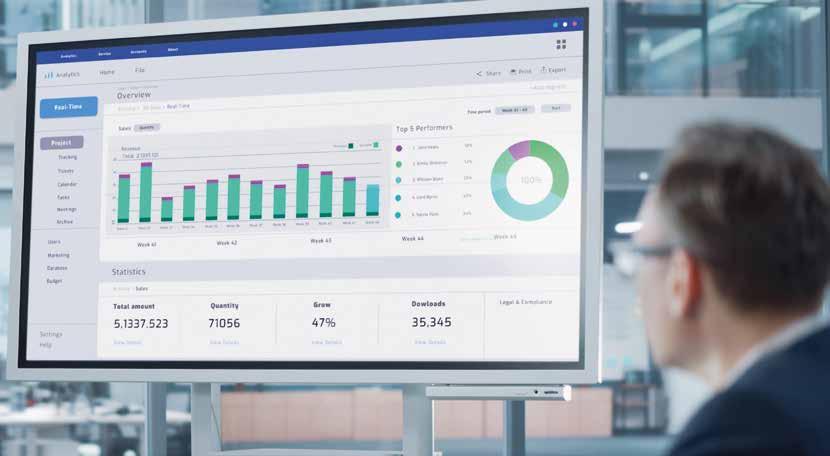
In 2022, the GFP made use of the hybrid event expertise accumulated since the onset of the pandemic to continue providing high-quality convening opportunities to its members. This allowed us to keep events easily accessible to audiences who would otherwise be unable to travel, as well as to continue offering a diverse line-up of high-level speakers.
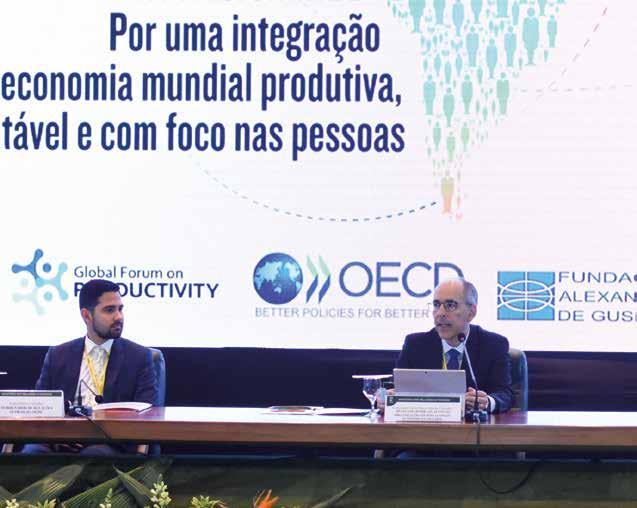
The Summit, jointly organised with the Brazilian government, gathered senior officials from OECD and LAC countries, international organisations, and representatives from both the private sector and civil society, around the theme “Towards a productive, human-centred and sustainable integration in the world economy”. More than 200 people participated
in person during the public sessions and close to 1000 people followed the streaming in English, Spanish and Portuguese during the three days of the event. Eight LAC Ministers/Vice-Ministers led discussions on which policy strategies can help lead the region towards a green, inclusive, and resilient post-COVID recovery, with a focus on
J Ambassador Carlos Cozendey (Brazil) delivers opening remarks at the GFP technical session.
j Panel session on “Productivity in the post-COVID world: upgrading human capital and adapting to telework”.
I OECD SecretaryGeneral Matthias Cormann speaks at the LACRP co-Chairs transition ceremony.
boosting productivity, creating solid frameworks for education and skills development, and promoting sustainable integration into the world economy.
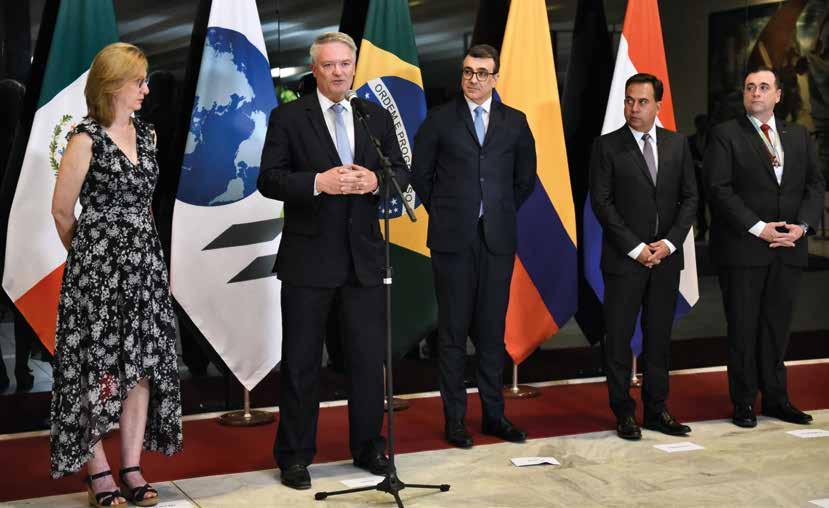

Insights from the GFP HSOP project were discussed in light of the particular LAC context, including considerations on the role of novel arrangements
such as telework. For the first time, the GFP team was also responsible for a full technical session, which featured a keynote speech by World Bank Chief Economist for LAC, William Maloney, and an intervention from former GFP Steering Group member Alonso Alfaro-Ureña, from the Central Bank of Costa Rica.
2022 Annual Conference of the Global Forum on Productivity co-organised with the European Commission Brussels, Belgium, 7-8 July 2022 (hybrid)
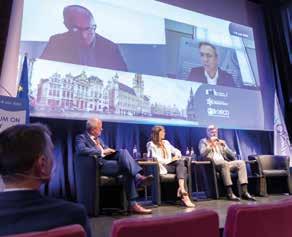
The COVID-19 shock and the associated policy response carries potential challenges for future productivity growth while also creating opportunities. From this perspective, the 2022 GFP Annual Conference aimed at shedding light on a number of questions.

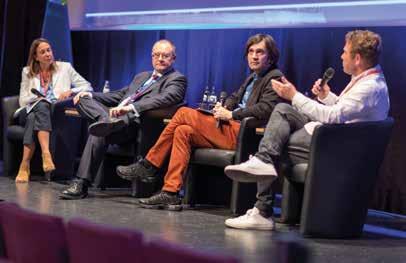
First, the recovery measures put forward by governments and international institutions to “Build Back Better” serve as a unique opportunity to accelerate climate mitigation. But how will the energy transition be shaped by innovation and resource reallocation and what are the broader implications for productivity growth?
Second, COVID-19 has accelerated the digital transformation and forced firms to experiment with new business models and modes of work. But will the diffusion of best practices be sufficiently broad to facilitate the catch-up of lagging firms? Or will it contribute to a further widening of differences in performance?
Third, the pandemic accentuated frictions in the international trading system and calls for greater self-reliance in some strategic sectors could lead to a significant re-organisation of global value chains. What are the related risks and opportunities for productivity growth?
J Policy panel on “The accelerated green transition in the post-COVID19 era: what implications for productivity?”.
K Session 2 on “Digital transformation and productivity”.
The program featured high-level officials from national and international organisations and senior academics, including the EU Commissioner for Economy, Paolo Gentiloni, and the SecretaryGeneral of the OECD, Mathias Cormann.
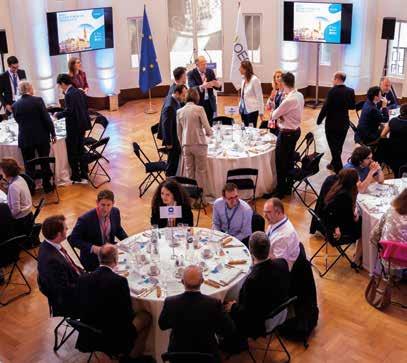
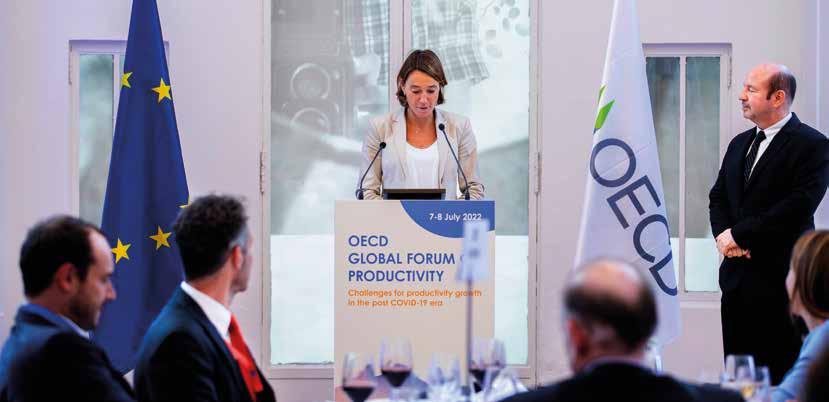
Keynotes and panellists throughout the first day of the event included Maarten Verwey (European Commission), delivering the opening remarks, Corrado di Maria (University of East Anglia) delivering the keynote speech, as well as Philipp Steinberg (German Federal Ministry for Economic Affairs and Climate Action), Philip Lane (European Central Bank), and Laura Diaz-Anadon (University of Cambridge), discussing the implications of the accelerated green transition for productivity. Debora Revoltella (European Investment Bank) chaired the panel on digital transformation and productivity, hosting Frederyk Warzynski (University of Aarus), and Mirko Draca (University of Warwick).
On the second day of the Conference (8 July), John Van Reenen (MIT and LSE) delivered the keynote speech, and Beata Javorcik (EBRD), Michael Brennan (Australian Productivity Commission), Swati Dhingra (LSE), Jose Maria Barrero (ITAM Mexico Business School) and Abigail AdamsPrassl (Oxford) presented their views on the reorganisation of production and the reallocation of resources in the post-COVID-19 period.
L Géraldine Mahieu (European Commission) delivers opening remarks at the conference dinner.
I Antoine Dechezleprêtre (OECD) discusses “The green transition and productivity” during session 1 of the conference.
 L Speakers and GFP Steering Group members gather for a dinner on the first night of the conference.
L Speakers and GFP Steering Group members gather for a dinner on the first night of the conference.
Workshop on Euro area’s productivity and competitiveness in the new challenging times (jointly organised with France Stratégie and the European Commission) Paris, France, 30 June 2022
In the framework of the French Presidency of the Council of the European Union, France Stratégie and the French National Productivity Council, together with the GFP and the European Commission, organised a conference to discuss the future of productivity and competitiveness in the Euro zone, the effects of the great pandemic and the on-going challenges.
The event featured speeches by Gilles de Margerie (General Commissioner of France Stratégie), Nadia Calviño (Deputy Prime Minister
and Minister of Economy and Digitalisation of Spain), Pierre Moscovici (President of the French Court of Accounts and of the High Council of Public Finances), Laurence Boone, (OECD Chief Economist and Deputy Secretary-General), Paolo Gentiloni (EU Commissioner for Economy), and Professor Philippe Aghion (Collège de France).
GFP Steering Group members Rita Bessone Basto (Portugal) and Chiara Peroni (Luxembourg) contributed to the discussions by sharing their experiences with their countries’ National Productivity Boards.
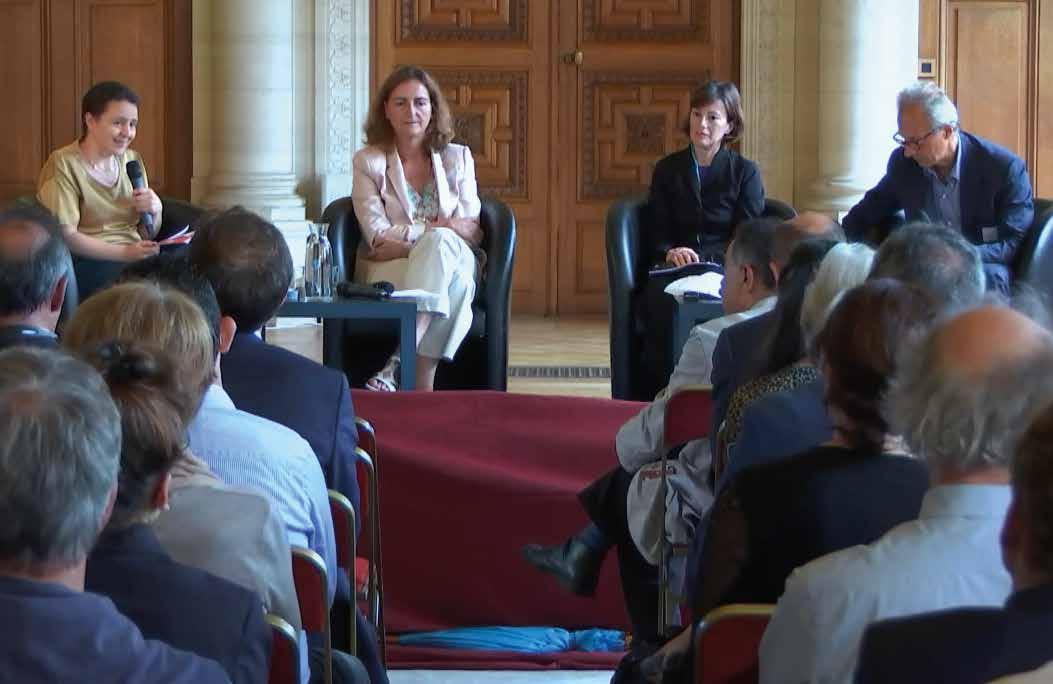
The communication activities of the GFP consist in disseminating information on GFP events, productivity-related findings and data as well as other useful work and links in contributing countries. To do so, the GFP team disposes of a number of instruments, namely the GFP website, the OECD Productivity Working Paper series, social media (Twitter and LinkedIn) and the mailing list used to circulate messages such as the periodic GFP Updates. Steering Group contributors of the GFP also have their exchanges facilitated by a password-protected ONE Community page.
Our biannual newsletter compiles the latest news in GFP work, teases upcoming events and advertises productivity-related information from GFP contributors. It has a public of over 400 subscribers – spanning policymakers, researchers, business representatives and OECD colleagues, among others.
The GFP accepts voluntary paper submissions from its supporters, to be published under the OECD Productivity Working Paper Series
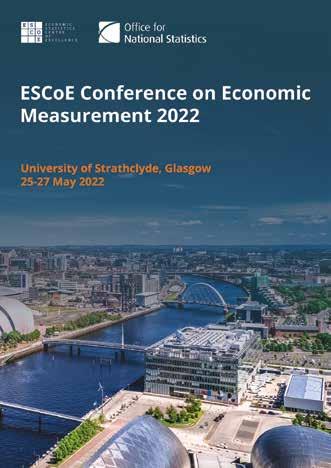
August 2022 |
Pro-Productivity institutions at work: country practices and new insights on their set-up and functioning Filippo Cavassini, Chiara Criscuolo, Francesca Papa and Fatima Talidi
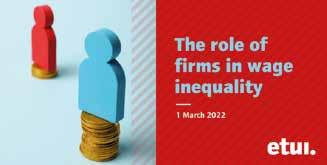
Please contact Productivity@oecd.org if you would like to publish your productivity-related paper as part of our series.

In 2022, the GFP updated its country profiles to include information on productivity research developed during the pandemic years, as well as new info on productivity-enhancing institutions across GFP Steering Group members.

l The Human Side of Productivity: Uncovering the role of skills and diversity for the productivity of firms -Key Highlights and Productivity Working Paper
l The role of telework for productivity and well-being during and post-COVID-19: results of an OECD survey among managers and workers (Key Highlights and Productivity Working Paper)
l The Green Side of Productivity
l Gender Diversity in Top Management and Firm Productivity
l GFP Webinar Series
– “Productivity slowdown and MNEs’ intangibles: where is productivity measure?”
l 2021 Annual Conference of the GFP, joint with Italian presidency of G20 (4 events)
– GFP Week Webinar Series
– Flagship hybrid Event broadcast from Venice
l OECD GFP Special Session at the 2021 Comparative Analysis of Enterprise Data (CAED) conference (Coimbra, Portugal and online)
l Fourth LACRP Ministerial Summit on Productivity
l 2022 Annual Conference of the GFP, coorganised with the European Commission
l Workshop on Euro area’s productivity and competitiveness in the new challenging times, jointly organised with France Stratégie and the European Commission Communication





